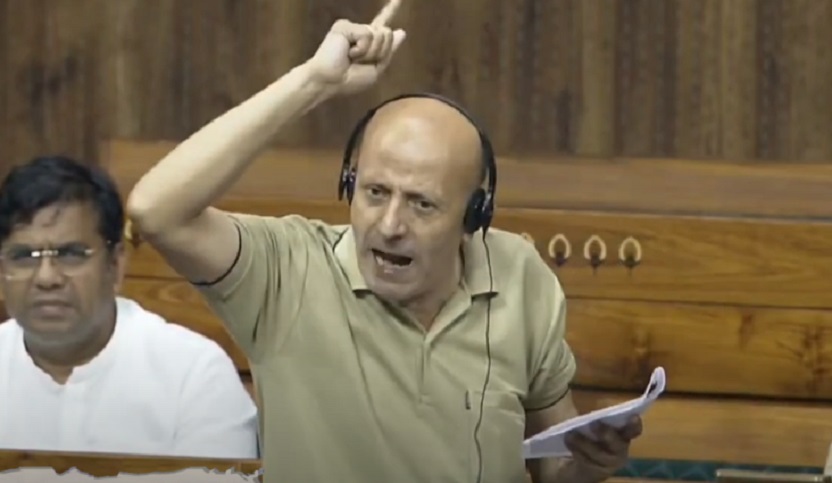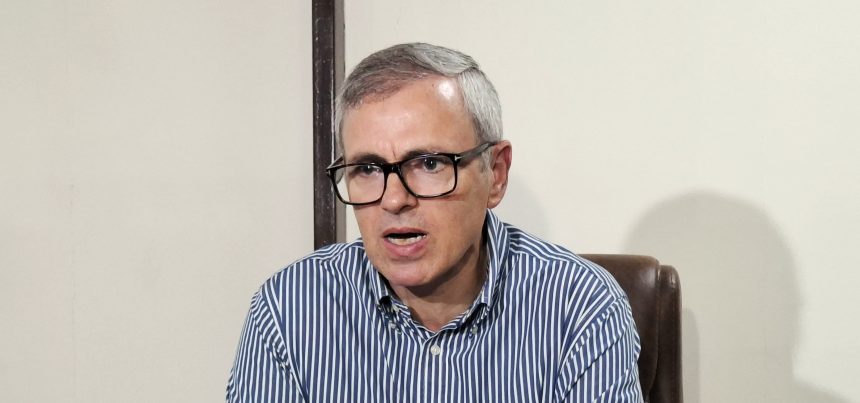MP Rashid’s Heartbreaking Appeal in Parliament: “Kashmiris Know What Loss Means” After Pahalgam Attack
By: Javid Amin | 29 July 2025
A Voice from Jail That Echoed Across the Nation
On a day when political barbs flew freely during the Operation Sindoor debate in the Lok Sabha, it was the voice of Engineer Abdul Rashid, the jailed MP from Baramulla, that cut through the noise with raw honesty and heartfelt emotion. Lodged in Tihar Jail under UAPA charges, Rashid was brought to Parliament after his family and supporters scraped together over ₹1.44 lakh for a single day’s parole to allow him to speak.
When Rashid stood up to address the House, it wasn’t rhetoric—it was a voice soaked in decades of grief, conflict, and unhealed trauma. His words about the Pahalgam terror attack were not just a condemnation—they were a plea for empathy, understanding, and a shift in national priorities.
“What Happened in Pahalgam Was the Murder of Humanity”
On July 24, 2025, terror struck Baisaran Valley, a serene tourist destination near Pahalgam, when militants opened fire on civilians, killing at least 26 and injuring scores more. The nation was shocked, but for Kashmiris, it was yet another day of tragedy.
Standing in the Parliament, MP Rashid called it what it truly was—“the murder of humanity.”
“When it comes to condemning the attack and the families’ feelings, Kashmiris know what loss means. Since 1989, Kashmir has lost more than 80,000 people.”
This wasn’t just a statement of facts—it was a recollection of a collective trauma. For decades, Kashmiris have lived under the shadow of conflict—facing militancy, military action, enforced disappearances, economic hardship, and relentless psychological tolls. Rashid’s words reminded Parliament that behind every headline, there is human pain.
His speech served as a moral indictment of the political and security approach that often excludes the lived experience of those in Kashmir.
A Tragic Statistic: 80,000 Lives Lost in Kashmir
The number 80,000 dead is often contested in political circles, but for Kashmiris, it’s not about the precision of the figure—it’s about the depth of the wound. These are sons, daughters, mothers, teachers, laborers, and students—people who were caught in the violent crossfire between militant groups and state forces.
Rashid didn’t cite this number for effect—he brought it up to highlight the sheer scale of loss and how that shapes the collective psyche of a people who see death not as headlines, but as neighborhood funerals.
“Each family of the Pahalgam tragedy feels what thousands of families have felt for decades. You cannot heal this wound without acknowledging it.”
The statistics carry more than just data—they carry stories, silences, and scars.
“To End Terrorism, You Must Win the Hearts of Kashmiris”
Perhaps the most important and overlooked part of Rashid’s brief but powerful intervention was his solution-oriented appeal. Instead of indulging in political blame games, he offered a simple but transformative message:
“To end and fight militancy, you have to first win the hearts of Kashmiris. Since yesterday, none of the leaders have spoken about Kashmiris.”
In a Parliament often obsessed with security operations and military might, this was a refreshing call for human engagement. Rashid asked:
-
Why is there no talk about healing Kashmir?
-
Why are Kashmiris viewed through the lens of suspicion, not inclusion?
-
Why does every terror attack result in more surveillance, but not more dialogue?
His questions challenged both the BJP government and the opposition for ignoring the human dimension of the Kashmir issue.
“I Come From a Place Situated at the LOC”
Unlike many parliamentarians who pontificate from TV studios or security-padded political events, Rashid comes from the Line of Control (LOC)—one of the most militarized and volatile borders in the world. His words carry authenticity and firsthand experience.
“I am not here to advocate for anyone. I am not taking sides. But I come from a place at the LOC—I’ve seen what conflict does to ordinary people.”
This neutrality is important. Rashid does not align himself with militant groups or political parties that seek chaos. He aligns himself with the people—the civilians who want peace, dignity, and development.
His speech was not only an appeal for empathy—it was a challenge to India’s political elite to listen to voices from the margins.
₹1.44 Lakh for a Day’s Voice: The Price of Democracy?
It’s heartbreaking and emblematic of the state of Indian democracy that a sitting Member of Parliament had to pay ₹1,44,795 to attend a single day of Parliament. The amount was paid to Tihar Jail authorities, which included security arrangements, logistical fees, and staff.
What’s even more striking is how that money was raised—not by corporations or political elites—but by ordinary people.
“Party workers and ordinary citizens came together. Some gave from their savings. Others skipped daily needs. Just so their representative’s voice could be heard in Parliament.”
This is the soul of democracy. The people of Baramulla understood that even if their representative was jailed, his voice was still theirs. In a political culture often dominated by money power, this act of collective sacrifice is revolutionary.
It also raises hard questions:
-
Why is democratic participation so expensive?
-
Shouldn’t a sitting MP be granted a voice without monetary burden?
-
Does the system want to keep dissent silenced by financial roadblocks?
A Family That Struggles Yet Stands
MP Rashid’s son, Abrar, laid bare the difficult life his family leads while his father remains behind bars. He revealed that the only income the family has is Rashid’s salary, from which they manage all expenses—including education, groceries, rent, and medical needs.
“We had to manage this huge amount with help from friends, supporters, and well-wishers. It’s not just about money—it’s about letting a voice be heard.”
The family is also awaiting the court hearing on July 31, with hope that justice may be served or at least a fair chance to defend Rashid may be offered.
Their story is not just personal—it is symbolic of the struggle many political activists and their families face when voices critical of the establishment are legally restrained or financially crippled.
Silence on Kashmiris in Parliament: Rashid’s Strongest Accusation
One of the most pointed criticisms in Rashid’s speech was that, even amid debates on Kashmir, no one had bothered to speak about Kashmiris themselves.
“Since yesterday, none of the leaders have spoken about Kashmiris.”
This statement hit hard. The Operation Sindoor debate largely revolved around political blame games, ceasefire decisions, and international diplomacy. But who spoke for the children who now live without parents? Who remembered the widows and orphans of Pahalgam?
This glaring absence of empathy reveals how Kashmir is often treated as a territory, not a community. Policies are made about Kashmiris, not with them or for them.
A Moment That Could Change National Dialogue
Engineer Rashid’s speech may go down in history as a watershed moment—not because it changed policy overnight, but because it changed the tone of the national dialogue.
He proved that even from jail, even with limited time, even with financial constraints—truth can still make its way into the corridors of power.
His three core messages:
-
Condemn terrorism without alienating Kashmiris
-
Empathize before you strategize
-
Ensure voices from the ground are not silenced by laws or money
These are not radical demands. They are democratic essentials.
Bottom-Line: A Jailed MP Gave Parliament Its Most Human Moment
In a country where Parliament debates are increasingly performative, it took a jailed MP from the troubled district of Baramulla, escorted from Tihar Jail, to remind India what politics should really be about—people, pain, and purpose.
MP Rashid didn’t give a long speech. But in just a few minutes, he said more than hours of shouting matches could. He reminded India that Kashmiris are not problems to be solved—they are people to be heard.
His words will echo in the hearts of every Indian who believes that democracy is about representation, not suppression.



